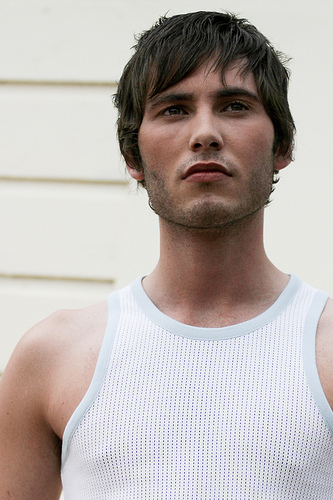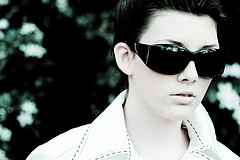
A good friend of me recently posted on a social media site that a recent photo shoot he had done had gone horribly wrong; sure, some of the photos came out all right, but none of them fulfilled the ‘vision’ he was hoping for from his shoot.
It’s heartbreaking when a lot of effort doesn’t pay off – but all you can do is to chalk it up as a writing experience. Analyse what went wrong, and then don’t do that again. It’s a slow way of learning things, of course, but things learned the hard way are generally learned properly – so there is a bit of a silver lining after all.
What can you do when you feel as if you’re properly starting to get the hang of photography, but you still want to learn more? There’s a simple trick you can use… And it really works, trust me.

Even photos that come out very well deserve a second thought. If I was in this situation again, what would I do differently? (click for full size)
Some of you might know that I’ve spent a lot of time working towards my advanced motorcycle licence with the Institute for Advanced Motoring. It’s bloody hard work, but it’s awesome as well: It serves to illustrate that even though I’ve got my full motorcycle licence, I didn’t really have much of an idea about how to keep myself in one piece on two wheels.
The IAM course (which, incidentally, is built on the Police system for Motorcycle Control. Check out Motorcycle Roadcraft or Roadcraft, the car version. It’s a bit of a revelation) teaches you to become psychic on the roads; I find myself slowing down for hazards that don’t even exist yet, I change lanes instinctively before something dangerous happens in my line, and I do overtakes on split-second decisions. And I can control my motorcycle better than I thought ever possible. It feels bloody awesome.
Haje, I didn’t come here to read about your two-wheeled prowess…
Okay, okay, my apologies. But trust me, there is a link here: All the things that are relevant to learning how to control a motorcycle at speed are relevant to photography as well; the ‘psychic’ element comes in when you’re working with studio work, for example – once you understand your equipment well enough, you can visualise what happens if you just add a smidge of power to your fill light, or add a slight warming filter to your main.
And, like riding a motorcycle, it feels flippin’ brilliant when you know something is going to happen. Then you do it. And then you check what happened. And it worked. It makes you feel great about yourself. Only recently, I was standing next to a photographer who was struggling to get the shot they wanted. Without even looking at their settings, I surmised they were shooting in Program mode, when what they wanted was a particular shutter speed to get a panning shot right. So I told them that a 1/45 second shutter time might be easier. They looked at me, changed their setting, and rammed home the shot. And bought me a pint, which I thought was a nice touch.

Once bitten, twice shy: If you can't learn from other people's mistakes, you've got to learn from your own. No, I agree, this caption doesn't really make sense, but I don't really have anything to say about this photo.
Anyway – I’m not the greatest of photographers, but the trick about getting much better at what you do, is to do everything consciously – even things that are instinctive. What I mean by that is that if you feel you need to change a setting or a lens, go ahead and do it. But the important bit is to go back to it later. Find out why you felt that way. ‘Because it was the right thing to do’ is not a valid reason – there was something that made you ‘feel’ that you could improve your photo in one way or another.
That feeling is extremely valuable. That’s your experience talking, and you have to talk back: It’s a skill, but more importantly, it is a skill you can develop with practice. So, if it’s practicable, stop right there and then, and have a think. Why are you making a choice to make a change? What is wrong with the photos you are getting, and what will the effect be of making the change? The answer to those questions will help you develop and become a better photographer. But you have to be conscious about it. Write it down, add it to your Flickr notes, tell other photographers about your choices. It doesn’t matter how you do it, but make sure you vocalise it. The next time you’re in the same situation, the perfect photo will roll out effortlessly.
Oh who are we fooling, I’ve never taken a perfect photo. And nor will you in your lifetime. But that’s the point: You become a better photographer by polishing one aspect of a photograph every time – and hopefully, the photos you take will be closer and closer to perfect for every day of shooting.
Didn’t you mention a simple tip?
God, I don’t half ramble on, don’t I? Do forgive me, I get very excited about photography. And motorcycling, for that matter.

It's worth re-visiting your photos after some time. This one, for example, sat in my archives for five years before I realised it was actually sort of a wicked shot - all it took was some Lightroom magic to make it sparkle.
Anyway: The real reason I started burbling along about motorcycling is that this is a tip I learned as part of my IAM training. Replace ‘ride’ or ‘drive’ with ‘photo shoot’ below, and you get the gist of the tip.
After every photo shoot, spend one minute to think about one thing you would improve about your most recent shoot. Don’t worry if you made lots of mistakes. Don’t worry if everything went wrong. Pick one thing you would improve. And think about how you could improve it.
The great thing about picking just one thing is that it’s bite-sized. You can process one thing, and you can come up with a plan with avoiding it next time. Missed the sunrise? Get up earlier. Didn’t get the photo of the soccer goal? Stand somewhere different. Scene too bright? Bring neutral density filter. Got your camera equipment stolen? Buy a big Rottweiler. Couldn’t get the toddler to smile? Bring that hyper-colourful hawaii shirt your wife hates so much. It’ll make the kids smile, trust me.
Eventually, you become good enough a photographer that most of your development will come from your own experience and the fact that you are challenging yourself. Always remember, though: There is always something you can improve. But only if you’re consciously working on it.
Do you enjoy a smattering of random photography links? Well, squire, I welcome thee to join me on Twitter - Follow @Photocritic
© Kamps Consulting Ltd. This article is licenced for use on Pixiq only. Please do not reproduce wholly or in part without a license. More info.






